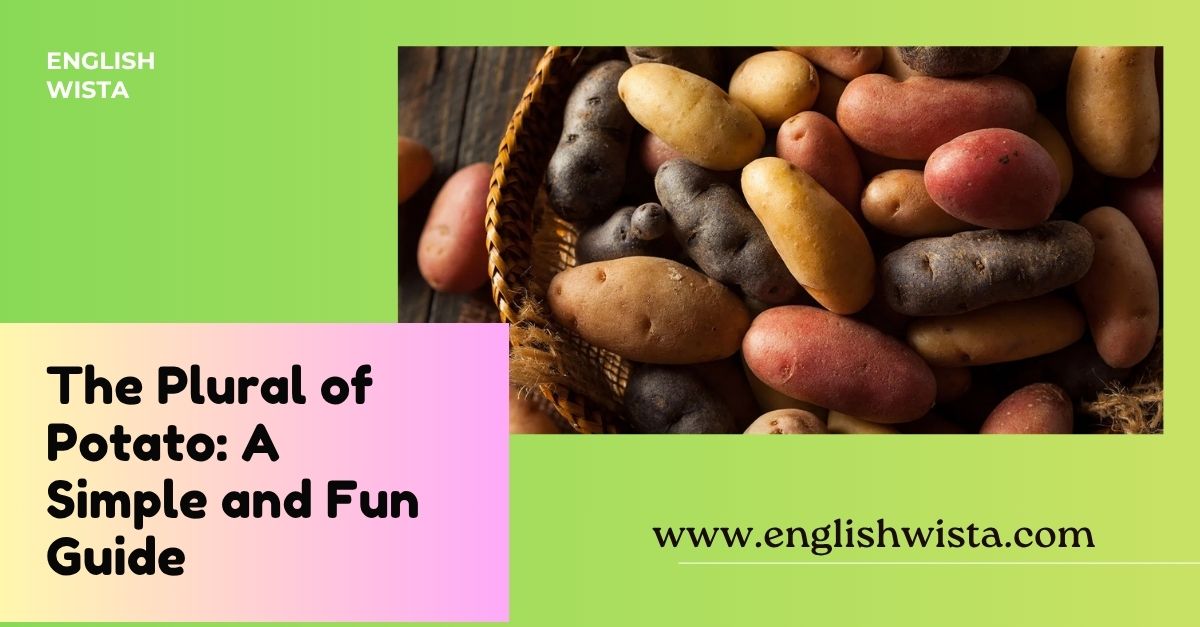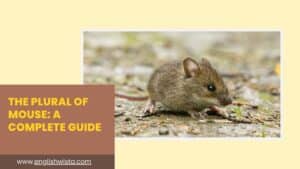Have you ever been writing something and suddenly stopped, wondering, “Wait… is it potatos or potatoes?” You’re not alone! Even native English speakers pause on this one. The plural of “potato” can feel a little tricky because it doesn’t follow the most obvious spelling rules. But don’t worry we’re going to break it down together in a friendly, step-by-step way.
By the end of this article, you’ll know the correct plural of potato, understand why it’s spelled that way, and feel confident using it in everyday writing or conversations. We’ll also explore fun examples, common mistakes, and even a few potato-related facts along the way. Let’s dig in (pun intended)!
What Is the Plural of Potato?
The correct plural of potato is potatoes.
That’s right it ends with -es, not just an -s. Many people make the mistake of writing potatos, but that’s not standard English. If you want to be correct, always write potatoes when talking about more than one potato.
Why Is It Potatoes and Not Potatos?
This happens because of a simple spelling rule in English. Words that end in -o sometimes add -es instead of just -s to form their plural.
For example:
- Tomato → Tomatoes
- Hero → Heroes
- Echo → Echoes
But not every word ending in -o follows this pattern. Some words simply add an -s. For example:
- Photo → Photos
- Piano → Pianos
- Radio → Radios
So how do you know when to use -es? The truth is, there isn’t a perfect rule that covers every word. English is full of exceptions! But for words like potato and tomato, the plural always takes -es.
Is Potato Singular or Plural?
The word potato is singular, which means it refers to just one.
Examples:
- I baked one potato for dinner.
- This potato looks bigger than the others.
When you want to talk about more than one, you use potatoes:
- I baked three potatoes for dinner.
- These potatoes look fresh and ready to cook.
Common Mistakes With the Plural of Potato
A lot of people especially when typing quickly write potatos. While this looks logical (since many words form plurals by just adding -s), it’s not considered correct in formal English.
Think of it like this: if you know tomato becomes tomatoes, then potato works the same way. Both are food words ending in -o, and both take -es in the plural.
Quick comparison:
- ❌ Incorrect: potatos
- ✅ Correct: potatoes
Example Sentences With Potato and Potatoes
Seeing words in real sentences always helps, so let’s practice with examples.
Singular (potato):
- I bought a large potato at the market.
- This potato has a funny shape.
- A baked potato is my favorite side dish.
Plural (potatoes):
- She peeled five potatoes for the soup.
- Potatoes grow underground in the soil.
- French fries are made from potatoes.
Notice how the meaning changes when we go from potato to potatoes. One means just a single vegetable, while the other refers to many.
Why Do Some Words Add -es Instead of Just -s?
Let’s take a quick detour into spelling. English words that end with certain letters often take -es instead of just -s. This usually happens when adding just -s would look or sound awkward.
For example:
- Box → Boxes
- Bush → Bushes
- Tomato → Tomatoes
So, adding -es to potato keeps the word easier to read and pronounce. If we wrote potatos, it might still be understood, but it wouldn’t follow the standard spelling pattern.
The Origin of the Word Potato
Sometimes it’s fun to look at where words come from. The word potato originally came from the Spanish word patata, which itself came from the Taíno word batata. Over time, English borrowed the word and changed its spelling.
Because English adopted the word long ago, it adapted the plural to fit English rules. That’s why we say potatoes today.
Potato vs. Potatoes in Writing and Speaking
In writing, it’s important to use the correct spelling especially in school essays, professional documents, or published work. Using potatos might look like a small mistake, but it can distract readers.
In speaking, you won’t hear the difference because both potatos and potatoes sound the same when pronounced. That’s why many people spell it wrong they only think about how it sounds. But when writing, always remember: potatoes with -es.
Comparing Potato With Other Words Ending in -o
Let’s look at some similar words to help the rule stick in your mind.
Words that add -es:
- Potato → Potatoes
- Tomato → Tomatoes
- Hero → Heroes
- Echo → Echoes
Words that just add -s:
- Photo → Photos
- Piano → Pianos
- Video → Videos
- Zero → Zeros (though zeroes is also accepted)
As you can see, the pattern is a little mixed. That’s why it’s best to memorize certain words like potato and tomato.
Fun Facts About Potatoes
Now that we’ve mastered the plural, let’s have some fun with potatoes themselves!
- Potatoes are the fourth most grown food crop in the world, after rice, wheat, and corn.
- They come in many varieties red potatoes, russet potatoes, fingerling potatoes, and more.
- The largest potato ever recorded weighed more than 10 pounds! Imagine making fries from that.
- Potatoes were first cultivated in South America over 7,000 years ago.
- In Ireland, potatoes became so important in the diet that when crops failed in the 1840s, it caused a major famine.
These fun facts show how important potatoes are not just in grammar, but in history and culture too.
A Quick Potato Grammar Quiz (For Practice!)
Let’s test your new knowledge with a few quick questions. See if you can answer before checking the answer below.
- I bought three ______ at the store.
- She ate a baked ______ with butter.
- Do you prefer sweet ______ or regular ______?
Answers:
- potatoes
- potato
- potatoes / potatoes
How did you do? If you got them all right, you’re now a plural potato pro!
Collective Nouns for Potatoes
Here’s a fun side note: when talking about a group of potatoes, we usually just say “a bag of potatoes” or “a sack of potatoes.” There isn’t a special collective noun like there is for animals (for example, a “flock of birds”).
So, if you’re writing or speaking, it’s perfectly fine to say:
- A pile of potatoes
- A basket of potatoes
- A bag of potatoes
Tips to Remember the Plural of Potato
Here are some simple memory tricks to help:
- Think of tomato → tomatoes. Potato follows the same rule.
- Imagine a farmer harvesting many potatoes from the ground more than one always takes -es.
- If you’re ever unsure, look it up in a dictionary or online before finalizing your writing.
Conclusion
So, what’s the big takeaway? The plural of potato is always potatoes, spelled with -es. Not potatos, not anything else just potatoes.
We’ve explored why the word takes -es, compared it to similar words, and practiced with examples. Along the way, we also discovered some fun facts about potatoes themselves.
Next time you’re writing a grocery list, chatting about dinner, or typing an essay, you’ll know exactly how to spell the plural. And if someone asks you, “Is it potatos or potatoes?” you can confidently answer: “It’s potatoes with an -es.”
Potatoes may be simple vegetables, but in English grammar, they’ve taught us an important lesson: sometimes the little details matter.
Now, go enjoy some mashed potatoes or maybe just a single baked potato if you’re not too hungry!



